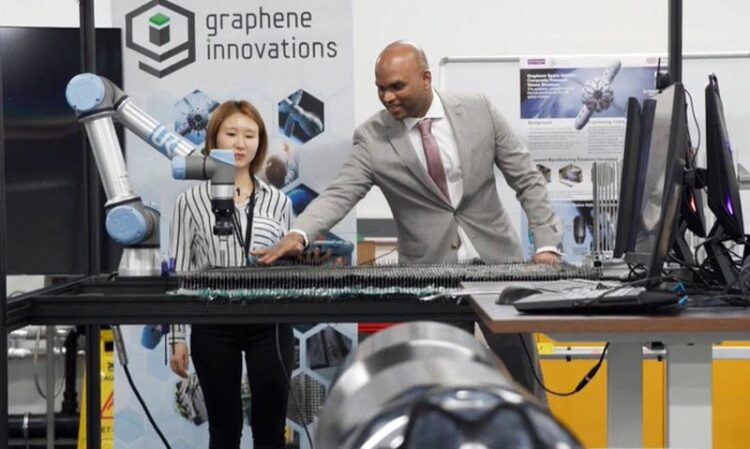Automation and advanced materials are the “dream team”

Graphene meets robots: pictured is robotics expert Jinseong Park and advanced materials pioneer Dr Vivek Koncherry who are developing a prototype digital manufacturing line at The University of Manchester
Credit: The University of Manchester
Graphene meets robots as automation is combined with advanced materials.
Automated systems combined with new materials will combine as a “dream team” to start a revolution in advanced manufacturing, says a graphene pioneer.
Automation and robotic systems are on the brink of transforming the way we all work and live says Dr Vivek Koncherry, who is based at The University of Manchester‘s Graphene Engineering Innovation Centre (GEIC). A UK government report has found that the total economic impact of automation across most UK commercial sectors will be worth £6.4bn by 2035.
Dr Koncherry and his team are developing a range of products exploiting breakthrough nanomaterial technology, including graphene.
However, to get this innovation to a mass market, Dr Koncherry recognises that manufacturing systems also need to keep pace – so he has built a pilot digital manufacturing line in the GEIC designed to handle materials of the future by integrating robotics, AI and IoT systems.
“The first industrial revolution in Manchester was world famous for its textiles and weaving technologies and we are at the start of the next industrial revolution – but this time we are to use advanced materials and advanced manufacturing processes,” he said.
“So, if you want to implement nanomaterials or the next generation of materials into the marketplace you will also need automation and the next level of advanced manufacturing to remain competitive at a global scale.
“In Manchester, everything comes together – you have expertise in both advanced materials and automated systems. The skilled people we need to work with are based in the same place, which creates a unique proposition.”
This positioning has already helped Dr Koncherry attract inward investment from North America, with $5 million (£3.6m) being put into his start-up Graphene Innovations Manchester (GIM).
Dr Koncherry and his team at GIM, including robotics expert Jinseong Park, are developing a range of products, including mats and floor coverings made from recycled materials – such as rubber from car tyres.
The group are also pioneering pressurised vessels made from a graphene-enhanced composite material. These components can be applied to hydrogen storage on earth or creating a habitat for living in space.
Dr Koncherry has an ambition to grow the manufacturing base in Greater Manchester and from this provide a model to underpin the UK’s national capability to making advanced products.
Media Contact
James Tallentire
University of Manchester
james.tallentire@manchester.ac.uk
Office: 07-532-282-824
All latest news from the category: Machine Engineering
Machine engineering is one of Germany’s key industries. The importance of this segment has led to the creation of new university degree programs in fields such as production and logistics, process engineering, vehicle/automotive engineering, production engineering and aerospace engineering among others.
innovations-report offers informative reports and articles covering technologies such as automation, motion, power train, energy, conveyor, plastics, lightweight construction, logistics/warehousing, measurement systems, machine tools and control engineering.
Newest articles

Innovative 3D printed scaffolds offer new hope for bone healing
Researchers at the Institute for Bioengineering of Catalonia have developed novel 3D printed PLA-CaP scaffolds that promote blood vessel formation, ensuring better healing and regeneration of bone tissue. Bone is…

The surprising role of gut infection in Alzheimer’s disease
ASU- and Banner Alzheimer’s Institute-led study implicates link between a common virus and the disease, which travels from the gut to the brain and may be a target for antiviral…

Molecular gardening: New enzymes discovered for protein modification pruning
How deubiquitinases USP53 and USP54 cleave long polyubiquitin chains and how the former is linked to liver disease in children. Deubiquitinases (DUBs) are enzymes used by cells to trim protein…



